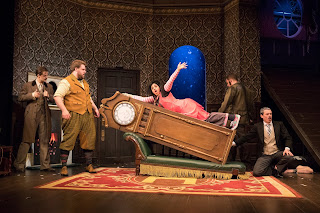Theater Review: Two Comedies Fall Flat
The Play that Goes
Wrong
By Henry Lewis, Jonathan Sayer, and Henry Shields
Lyceum Theater, Manhattan
January 23, 2018
Jerry Springer, The
Opera
Music and Lyrics by Richard Thomas
Book by Stewart Lee and Richard Thomas
The New Group
January 28, 2018
After a theater season stuffed with lots of grim,
psychological, or apocalyptic themes, I have somehow managed to see three
comedies in a row. One, Mankind (see my review last week) was brilliant—thought provoking and politically astute as
well as funny, if in a dark sort of way. Two more plays reminded me that comedy
is a very individual thing, and what makes one playgoer roll on the ground in
hysterics can be met by indifference by another.
The Play that Goes Wrong is a silly affair, indebted to Monty
Python or (more distantly) Joe Orton, but without their intelligence and
political satire. It is a very old-fashioned PG-rated farce about an amateur
British drama club that attempts to mount a murder mystery, The Murder at Haversham Manor. It is
filled with pretty much every detail of a flawed amateur production that you
can imagine: misfunctioning or collapsing sets, indisposed performers with
inept replacements reading from the script, scene-chewing wannabe stars, overly-controlling
mediocre directors, lighting cues mistimed or mis-aimed--you get the picture. I
loved the play’s eye for detail. For example, the program begins with the
“fake” program of the amateur club, and one notes that the lead actor (and
president of the club) has also been the director, designer, costumer, prop
maker, dramaturg, voice coach, dialect coach, and fight choreographer. A note from the director/club president
apologizes to those in the audience who, due to a confusion in publicity,
showed up expecting a performance of Equus
(or Hamilton). There were some
helpful notes on the actors’ preparation for their roles, such as following
Chekhov’s admonition to “burn inside with an outer ease” by going out for
Vindaloo at a local restaurant prior to the performance. The play does what it
does (slapstick, lots of bad jokes and puns) with good spirits and unrelenting
energy, and most in attendance seemed very happy and amused.
I found it
wearying after an hour or so. Monty Python produced 30-minute manic episodes,
not two-hour ones (except for their movies which added more real plot), and
Orton, Noel Coward, and Neil Simon used verbal intelligence to keep their jokes
and situational comedy balanced. Not here. If, however, you are in the mood for
some slapstick diversohumor suitable for all ages, this play may do the trick.
Jerry Springer, the
Opera aims a bit higher. It is a true musical, with over 25 numbers, mostly
very witty and jazzy, performed with infectious enthusiasm. The cast of twelve
alternates between playing dysfunctional guests on the show, singing dancing angels
and devils, and malicious audience members, seated in the first row and heaping
abuse on the narcissistic guests. The actual Springer Show is amazingly still
rolling after 27 years, but peaked in the 1990s as a pop culture phenomenon.
Springer himself (played here by Terrence Mann) is an ex-mayor of Cincinnati
who did the reverse of Schwarzenegger and Trump, moving from politics to entertainment. Jerry
Springer the Opera, written by Brits, debuted in 2003, near the height of
Springer’s popularity, and was a London vehicle for British ridicule of 1990s American
narcissism and tastelessness. It later played in Las Vegas and US regional
theaters, but this is apparently its New York City premiere. I am sure the
timing of this had something to do with our epoch’s juxtaposition of
tastelessness and politics, reviving some of the tackiness of the 1990s. The
musical succeeds reasonably well, but feels amazingly dated, even nostalgic—remarkable
since it was only written 15 years ago. The “outrageous” guests with their forays
into kinky sex, transgender prostitutes, polygamy now do not seem so salacious,
and struck me as relics of a bygone era when shock was more easily achieved.
For the Brits in 2003 this musical may have been a devastating critique of US mores,
but now it comes across as a bit of a period piece. What is topical and
depressing is that a resurrection of this era is now in progress (note that The Apprentice started in 2003, the year
this show was written). Jerry Springer is just as likely as presidential candidate
for this era as is Mr. Trump, but is better qualified, having had a legitimate
political career in the past.
The show itself rides on clever songs, with some lyrics
updated from 2003 to our era, all delivered by a very multitalented and hyperactive
cast. The first half is a musical version of a typical show episode, ending with a wild choreographed number involving the Ku Klux Klan (this made a few in the audience a little uncomfortable given recent racially charged events in the US).
The
second half shows a Don Giovanni-like summons of Springer to hell. I found it
entertaining but, like The Play that goes
Wrong, a bit lacking in wit and intelligence, and too relentlessly
energetic, so that novelty and shock quickly wore off. I suppose I am jaded,
since I think that the adult animated series South Park’s versions of hell are far more witty and trenchant, as
well as more radical in tone (see this classic,
for example, noting carefully the famed residents of hell). Many in the
audience seemed to need the catharsis provided by this show, as they projected
anti-Trump feelings on the Springer character as he wrestled with his legacy
and soul. For me, Springer the Opera
lacked that last bit of intelligence that would have made it a truly effective
critique of our era, rather than a wistful return to the years of Bill Clinton
and George Bush.



Comments
Post a Comment